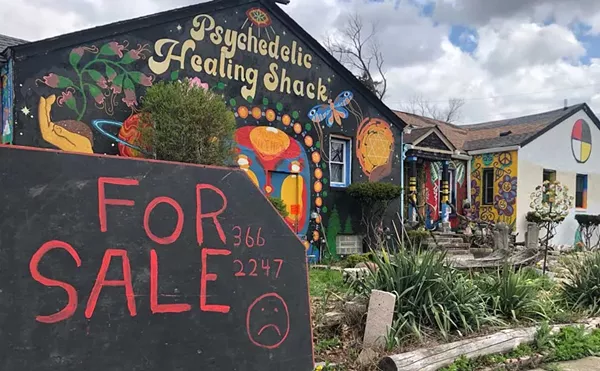Anna Clark, editor of 'A Detroit Anthology'
Writer discusses upcoming book, as well as Write a House project.

Audio By Carbonatix
[
{
"name": "GPT - Leaderboard - Inline - Content",
"component": "35519556",
"insertPoint": "5th",
"startingPoint": "3",
"requiredCountToDisplay": "3",
"maxInsertions": 100,
"adList": [
{
"adPreset": "LeaderboardInline"
}
]
}
]
Anna Clark wears many hats. A freelance writer living in Detroit, her work has appeared in The New Republic, American Prospect, and Salon, among others. She’s a writer-in-residence for the InsideOut Literary Arts Project, a gig that sees her teaching creative writing at Detroit high schools, and she’s also a board member of Write a House, a residency program that aims to fill three houses in a neighborhood north of Hamtramck with writers. She also edited A Detroit Anthology — a collection of stories from the likes of Jalopnik’s Aaron Foley, noted sociologist Thomas Sugrue, and MT’s very own Larry Gabriel, to name a few — which will be released by Rust Belt Chic on May 12.
Metro Times: What were you looking for in the submissions for A Detroit Anthology?
Anna Clark: My role was to solicit a really diverse and thoughtful collection of submissions. I spanned the city, certainly trying to encourage people I was fans of to submit, but also really getting a very broad network — and indeed, a lot of really amazing submissions came through that way. After spending a little time looking through them and seeing a few gaps that I thought were important to fill, I went out and recruited some other pieces that I thought made a more complete book.
MT: So what did you get? What did you not get?
Clark: Honestly, it’s pretty fascinating to see what the bulk of submissions were about. A lot of people ended up writing about the experience of neighborhoods, whether it was growing up in them, or leaving them, or returning to them as grandparents … that sort of day-to-day life component was a big story that showed up in there. And there were other topics that I was sort of surprised that there weren’t more stories about, some of which I went out to solicit because I thought it was important to fill. Like sports — I was surprised there weren’t more sports stories that came in the initial submission period. Same thing with art, too — we really wanted some good photographs. A lot of beautiful images came in … but I noticed in the initial submission period there was a dearth of images with people in them. There were a lot of landscape shots. This is a story about people! So that was one of the things I went to go chase some folks down ... to find a broader range of photos to eventually put in the book. It was a lot of hustling, but it was really fun.
MT: In the foreword, you say this is a book of Detroit stories for Detroiters. On the one hand, that limits your audience, but on the other, it seems like you can’t go anywhere on the planet without running in to somebody from Detroit, or at least Michigan.
Clark: It’s actually amazing how many people have some kind of connection to the city, even if they’re not living here right now or didn’t grow up here. We know this in a really visceral way that there’s a lot of interest in the city, and sometimes this shows up in less than ideal ways. But I think that putting together a collection of stories that really center the voices of Detroiters and the people who actually have on-the-ground experience here — people who are the city, ultimately — I think there's a lot of interest in that because sadly, that hasn’t had too much of a stage in the broader literary world. At least not a sufficient story. I think there's a decent amount of interest in it, and I’m excited to see what folks think when it actually gets out in the world.
MT: You organized the stories into a theatrical play structure, with a first act, an intermission, and a second act. Was that something you planned on all along?
Clark: That came through organically. The pieces all stand on their own, and they’re great pieces, but in juxtaposition you can see interesting stories kind of emerge — or something referenced in one person’s piece gets a fuller fleshed story in somebody else’s. The idea of us being in a city where we're all connected really shows up on the page, and it wasn’t planned at all. It just showed up because it’s true. I think that was part of how ordering it in that theatrical format emerged. I like it because it gives it a sort of sense of progression through the book. There are a lot of voices, there are a lot of pieces, and I think it helps splice things together. I think it also underscores the fact that every piece is part of the complete whole, you know, like every one of these stories, every one of these photographs have a key part in that ongoing … show, for lack of a better word.
MT: Did any of the stories surprise you?
Clark: I liked learning about one woman who is an actress for Wayne State medical school, of all places [Karen Minard’s “SOBs and Dummies”]. Apparently they have a whole program where actors and actresses are hired to be sort of fake patients that the medical school’s students practice on … it’s hilarious, and so strange, and she wrote it in a really lighthearted and funny way. I had never even heard about this, and I thought it was so fascinating. Another thing, as an avid sports fan myself I was delighted that we have three pieces that center on sports in some way, and I like that two of the three of them are written by female fans, who I think are — unfortunately, and weirdly — not part of the template of sports fans. So that delighted me.
MT: Tell us more about this Write a House project that you’re involved in.
Clark: Right now we’re working on getting our applications ready to go so we can actually open it up. I’m also working on the literary committee, the group that makes sure that Write a House is an engaged and thoughtful and contributing member to the broader literary community of the city. And that sort of ties into this other hat I wear, which is running a group called Literary Detroit. If Write a House is really committed to developing the literary community of the city through writers, Literary Detroit is interested in getting the same thing, but sort of from a reader perspective. We do really inclusive and diverse and interactive book events around the city. I like having one foot in both worlds, trying to catalyze what’s already here in the literary community in Detroit but also trying to grow it from both the writer and reader end.
MT: So the idea is to give writers houses? Do they get the house for a period of time, or do they get to keep the houses forever?
Clark: The idea is that it’s forever. There’s a few little things — the house will be free, but [the writer] is responsible for things like taxes, the basic bills, and things like that. There's also a two-year pilot period. A house is a big deal, so we’ll go through them and make sure it’s a good fit, and that everything is working out alright. If it isn’t, somebody can move on and that’s fine; no hard feelings. If they want to sell the house, Write a House gets the first option to buy it back. That’s something to discourage flipping houses because, of course, we want stability in the neighborhood. Beyond that, if everything’s going well … it’s theirs to keep.
A Detroit Anthology has a book release party at 7 p.m. May 31, at Practice·Space, 2801 14th St., Detroit.






